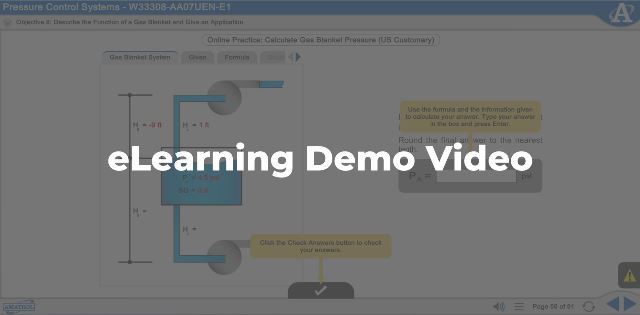Amatrol’s eLearning curriculum is unique in that it thoughtfully combines in-depth theoretical knowledge with practical, hands-on skills. This powerful combination of knowledge and skills solidifies understanding and creates a strong foundation for pursuing more advanced skills.
For example, the mechanical assembly skills eLearning course covers important topics, such as:
Threaded Fasteners
Learners begin with an introduction to threaded fasteners, including assembly concepts, bolts, and washers. Individual lessons focus on topics like categories of threaded fasteners, bolt types and sizes, and types of washers. Learners will also practice skills, such as identifying bolt type given a sample, identifying US customary bolt grade given a sample, and identifying washer type given a sample.
Wrenches
Learners will study the components and operation of wrenches, including fixed, adjustable, Allen, and ratchet wrenches. Individual lessons focus on topics like types of fastener compounds, wrench safety rules, and the sequence used to tighten bolts arranged in a pattern. Learners will also practice skills, such as inspecting and installing a threaded fastener and using an adjustable wrench to tighten a threaded fastener.
Pneumatic System Fabrication
Learners using Amatrol’s mechanical assembly skills eLearning course will study basic principles of pneumatic system fabrication, including fluid circuit and pipe thread components and pneumatic fittings and tubing. Individual lessons focus on topics like types of pneumatic system conductors, styles of pneumatic fittings, and how to install pipe thread fittings. Learners will also practice skills, such as installing a barb fitting onto a rubber hose, identifying fitting type and style given an example, and installing a ferrule-type fitting onto pneumatic tubing.
Screwdrivers
Learners will study various aspects and components of screwdrivers, including screws, types of screwdrivers, and nut drivers. Individual lessons focus on topics like how machine screws are designated, screwdriver safety rules, and the construction of a nut driver. Learners will also practice skills, such as identifying a screw type and size given a sample, using a Phillips head screwdriver to tighten a threaded fastener, and using a nut driver to tighten a threaded fastener.
Pliers and Locking Devices
Learners using Amatrol’s mechanical assembly skills eLearning course will study pliers and locking devices, including clamps, vises, and rings. Individual lessons focus on topics like how to use a C-clamp to hold parts during assembly, the operation of a cotter pin, and how to use twisted safety wire to lock a nut. Learners will also practice skills, such as using a vise to hold parts during assembly, identifying a nut locking device given a sample, and installing a snap ring.
Mallets and Non-Threaded Fasteners
Learners will study the components and operation of mallets and non-threaded fasteners, including fasteners, pins, and press fit assembly. Individual lessons focus on topics like types of hammers, how keys and keyseats are sized, and the operation of various types of pins. Learners will also practice skills, such as using a dead blow hammer to perform an assembly task, assembling two parts using a key fastener, and identifying a pin type given a sample.
Torque Wrench
Learners using Amatrol’s mechanical assembly skills eLearning course will study basic principles of torque wrenches, including process control concepts and applications. Individual lessons focus on topics like how torque is calculated, categories of torque-controlled tools, and common errors that result in improper fastener torque. Learners will also practice skills, such as calculating torque using the torque formula, using a manual torque wrench to tighten a fastener to a specified torque, and using a torque wrench and backup wrench to tighten fasteners.
Portable Power Tools
Learners will study various aspects and components of portable power tools, including portable drills/drivers. Individual lessons focus on topics like portable power tool safety, types of battery-operated tools, and how to install tooling in a drill/driver. Learners will also practice skills, such as identifying portable power tool hazards, operating a battery-operated drill/driver, and using a portable drill/driver to tighten fasteners.














































